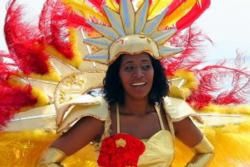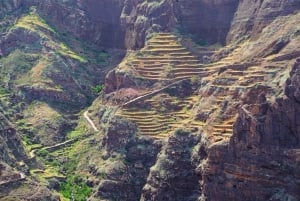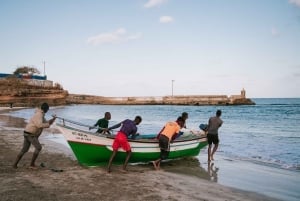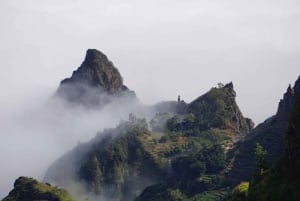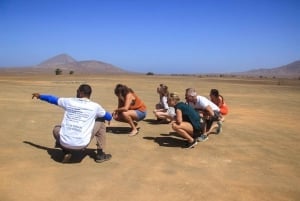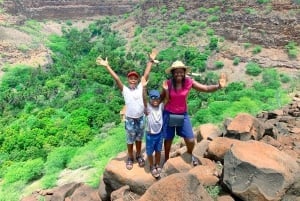Festivals and Traditions
Festivals & Traditions
Cape Verde's festivals and traditions are rich, vibrant and a reflection of their colourful history. They stem from their African roots to the colonial occupation and the Disporia through to independence and the hope of the new democratic Republic of Cape Verde.
These festivals and traditions contain aspects of Catholicism, the supernatural and the effect of slavery during colonialism.
Carnival
The most famous festival in Cape Verde is Carnival, normally held on most of the islands in February, close to Ash Wednesday. The streets are awash with revellers in fancy dress and the atmosphere is electrifying. Feel the beat of the music, as you watch the colourful float processions and marvel at the flamboyant costumes. The mood is also competitive as local districts compete for the attention of the judges, to be crowned the winner of the best street float. With its Brazilian influence, spontaneous street parties and electrifying atmosphere, Mindelo Carnival on the Island of Sao Vicente is by far the biggest with tens of thousands of people joining the festivities.
Music festivals
Baia das Gatas
The musical event held on the Island of Sao Vicente, was started in 1984 by a group of friends who wanted to create a way to meet and share musical ideas, but also as a way to create solidarity and peace throughout Cape Verde. The event now involves not only Cape Verdean musicians but also international artists, and attracts tens of thousands of people not only from Cape Verde but also from across the globe.
The music festival of Baia das Gatas is held on the beach over a long weekend in August close to the full moon. It's one of the largest open air music festivals in West Africa, and has become a celebration of Cape Verean culture. There are numerous food stalls where you can try Catchupa, fagalada and of course lots of beer and Grogue. The night eventually turns in to one big party and giant disco.
This music festival is seen as the blueprint for the others on Sal and Santiago for example the Gamboa music Festival normally held in May.
Sal Music festival (Sept)
The Sal Music festival is held in September over a weekend, has now evolved into a big event attracting local and international artists. The music played is a fusion of many different styles and influences and is a great spectacle. Cape Verdean people from across the Islands as well as tourists flock to Santa Maria beach and generally camp out on the beach for the duration of the festival. When the sun goes down bonfires are lit and the party goes on through the night. (Unfortunately due to lack of funds and the economic climate, the music festival will not be held in 2012, hopefully it will be back in 2013.)
Tabanka
Tabanka is an annual tradition, dating from the 18th Century and is a reflection of Cape Verde's passage through history. Its origins create debate amongst Cape Vedean scholars but some believe they are from Guinea Bissau.
Tabanka, is a complicated theatrical performance, which lasts for ten days. Members of the tabanka association take on roles such as the King and Queen, members of the Royal Court and military personal. The festival begins with a ceremonial mass where the "Thief" steals a relic from the chapel of the saint. During the next week, nightly prayers for the return of the relic are performed. The thief then leads the members of the Tabanka to the location of the relic, the safe return of the relic then sparks off the celebrations, which includes a street procession. The interesting thing is the interpretation of the meaning of the ceremony and its intertwined mix of catholic and African origins.
History tells us that the Tabanka Associations were seen in a political light as a symbol against colonialism and of the new Cape Verde, free from colonial rule. Tabanka gives us an interesting understanding of the national identity of Cape Verde. There is a Tabanka museum on the Island of Santiago.
Batuku
Batuku is performed mainly in Santiago and is a powerful, sensual dance ritual performed by women. It involves a single performer in the centre of a circle surrounded by women singing in chorus, striking a folded cloth held between the knees. The elder controls the rhythm, as the tempo becomes faster and faster. The songs are full of empowering messages of freedom and courage.
The Flag Feast
The flag feast is held on the Island of Fogo on April 30th in the city of Sao Filipe named after the patron saint of Fogo. It starts with the ritual of women peeling and pounding maize in a pestle to the beat of the drum. The flags are important symbols and are blessed in water. Fogo males compete in horse races to have the honour of organizing next year's event. The event combines a ceremonial mass and street party.
The Festival of Sao Joao 24th June (Saint John)
The festival of Sao Joao is a passionate affair involving folk dancing, singing and street parties. A fire is lit, to warn off evil spirits and protect the fertile land, as women dance the sensual Kola Dance, while calling out their song, as the sound of the drums becomes louder and more intense.
The jovial street parties, involve a symbolic representation of pirates who stole from the local people. Performers dress up in costumes representing ships, demanding gifts from passers-by.
National Holidays
| 1st of Jan | New Year |
| 13th January | Democracy and liberty day |
| 20th January | National Heroes Day |
| 1st May | Labour Day |
| 5th July | Cape Verdean Independence Day |
| 15th August | Our Lady of Grace |
| 1st November | All Saints Day |
| 25th December | Christmas Day |


